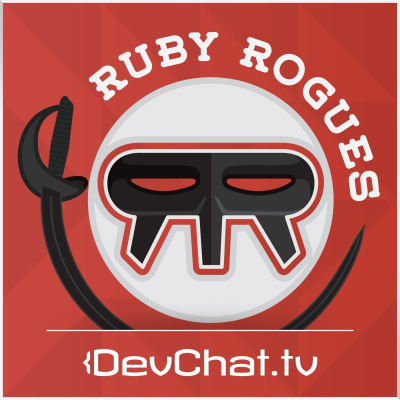Sinopse
All ruby related podcasts from Devchat.tv, including: - Ruby Rogues - My Ruby Story - Ruby Rants
Episódios
-
RR 381: “Ruby GUI Development” with Saverio Miroddi
25/09/2018 Duração: 39minPanel: Charles Max WoodDave KimuraEric Berry Special Guests: Saverio Miroddi In this episode of Ruby Rogues, the panel talks to Saverio Miroddi who is an engineer among other things. Saverio has written articles, and a link to two of his articles is found below. The panel and Saverio talk about Ruby, Ruby Motion, Shoes, Hackety Hack, and much more! Check out the episode!Show Topics:2:05 – Chuck asks a question.2:42 – Chuck: What do you recommend for the listeners?2:49 – Saverio: At the time I recommended an underdog. Now, making a recommendation is kind of hard. It depends on what they need. It’s fascinating in a way, because web development is not straightforward. Through the choice the subject is so wide.3:58 – Panelist: Building desktop applications the very last thin I think: I should build this in Ruby. It sounds like I am not the only person. Why would people want to build desktop apps in Ruby versus another program?4:38 – Chuck: I was thinking the same thing.4:59 – Saverio: Personally, I like consisten
-
RR 380: "Deploying Ruby on Rails application using HAProxy Ingress with unicorn/puma and websockets" with Rahul Mahale
18/09/2018 Duração: 01h01minPanel: - Charles Max Wood- Dave Kimura- Eric Berry Special Guests: Rahul MahaleIn this episode of Ruby Rogues, the panel talks to Rahul Mahale. Rahul is a Senior DevOps Engineer at BigBinary in India. He has also worked with SecureDB Inc., Tiny Owl, Winjit Technologies among others. In addition, he attended the University of Pune. The panel and the guest talk about https://kubernetes.io.Show Topics:1:25 – https://www.teepublic.com/t-shirt/3074500-ruby-rogues?store_id=172938 1:49 – Chuck: Why are you famous?1:57 – Guest’s background.4:35 – Chuck: https://kubernetes.io – Anyone play with this?4:49 – Panelist: Yes. Funny situation, I was working with https://www.heroku.com/languages. https://www.heroku.com/languages is very costly, but great.The story continues...6:13 – Panelist: I was so overwhelmed with how difficult it was to launch a simple website. Now, that being said we were using the https://aws.amazon.com/eks/, which is the https://kubernetes.io. They don’t have nearly as much good tools, but that’s my
-
RR 379: "Caching in Rails" with Jeff Kreeftmeijer
11/09/2018 Duração: 53minPanel: - Charles Max Wood- Dave Kimura- Eric Berry Special Guests: https://jeffkreeftmeijer.com In this episode of Ruby Rogues, the panel talks to https://jeffkreeftmeijer.com who is a Ruby and Elixir developer at https://appsignal.com. Jeff writes for the https://appsignal.com newsletter and has a blog. Check out today’s episode where the panel talks about AppSignal, Russian doll caching, Drifting Ruby, JavaScript Sprinkles, cache warming, N+1 plus other topics.Show Topics:2:47 – Code Fund & https://newrelic.com/?gclid=EAIaIQobChMIpbDg_MSz3QIVAhtpCh2qpgebEAAYASAAEgJnivD_BwE&utm_campaign=googlebrand+JM+ABM+Q1FY19+acq+NORAM&utm_medium=PS&utm_source=Google 3:40 – https://appsignal.com might be the only support for https://elixir-lang.org.4:12 – The integration, the ease was so simple and your (Jeff) documentation made it very easy.4:46 – Comparatively to New Relic, https://appsignal.com is cheaper, isn’t it?4:59 – We don’t charge for host, we charge per request. That’s where to difference in pri
-
RR 378: Ruby performance: MJIT with John Hawthorn
04/09/2018 Duração: 44minPanel: Charles Max WoodDavid RichardsDave KimuraEric Berry Special Guests: John HawthornIn this episode of Ruby Rogues, the panel talks to John Hawthorn about MJIT. John has been a Ruby programmer for about 9 years and is based in Victoria, B.C. They talk about what MJIT is, the effects you can see from using the MJIT compiler, and why the JIT doesn’t always work with other languages. They also touch on how you can use the JIT in your own code, how he makes his performance better, and more!Show Topics:1:36 – John is a Ruby programmer, and has been one for the past 9 years, and he is based out of Victoria, B.C.5:00 – He had always been curious how a JIT would work and found that it was always too difficult to work with. Since discovering MJIT, he has been able to work with these compilers because he understands how to work with C code.7:36 – Ruby has a bytecode and it looks a lot like an assembly language, which is approachable to a Rubyist.8:24 – The core of MJIT is an ERB template which take this bytecode, l
-
RR 377: Upgrading a Rails application incrementally with Luke Francl
28/08/2018 Duração: 53minPanel: Dave KimuraEric Berry Special Guests: Luke FranclIn this episode of Ruby Rogues, the panel talks to Luke Francl about his article “Upgrading Rails applications incrementally”. Luke works at GitHub on search and has been there since October 2017. Before working at GitHub, he worked at a search startup that was working with Rails and Elasticsearch. They talk about things that people take for granted with search, the impending takeover of GitHub from Microsoft, and what open source looks like today. They also touch on the process of getting hired at GitHub, his process for upgrading Rails applications, and more!In particular, we dive pretty deep on:Luke introWorking with Rails and ElasticsearchWhy he decided to come to GitHubSurreal working at GitHubWhat are some of the things that people take for granted with search?What people expect from searchWordpressGitHub has been very focused on the Microsoft deal recentlyCode SponsorGitHub/Microsoft owns open sourceOpen source todayKubernetesThe GitHub officeWhat
-
RR 376: "Ruby Performance" with Nate Berkopec
21/08/2018 Duração: 01h06minPanel: Charles Max WoodEric BerryDavid Richards Special Guests: Nate BerkopecIn this episode of Ruby Rogues, the panel talks to Nate Berkopec about Ruby Performance. Nate is a freelance Ruby performance consultant and he writes and works on Ruby application performance, specifically Rails applications, which he has been doing for the past 3 or 4 years. They talk about his past experience, what led him to Ruby performance, and why he loves Turbolinks. They also touch on the two benefits to performance work, if Ruby performance on the back-end really matters for the majority of cases, and more!In particular, we dive pretty deep on:Nate introRuby and RailsWas on Shark TankWhat led you into Ruby performance?Always enjoyed the easily quantified parts of developmentPerformance work is very cut and dryWhy do you love Turbolinks?100ms to Glass with Rails and Turbolinks – Turbolinks articleThe beauty of TurbolinksThe Complete Guide to Rails PerformanceThe two benefits to performance workMaking things scalable and back
-
RR 375: "How to Contribute to Ruby" with Sihui Huang
14/08/2018 Duração: 58minPanel: Eric Berry Special Guests: Sihui HuangIn this episode of Ruby Rogues, the panel talks to Sihui Huang about his article "How to Contribute to Ruby." Sihui is currently a back-end engineer at Gusto, which is a startup that works with payroll, benefits, and HR for companies. They talk about her experience in the programming world, why she chose to work with Ruby, and they touch on her article and why she decided to write it. They also touch on the three focuses for Ruby 3, if she thinks Ruby has a long time future, and more!In particular, we dive pretty deep on:Sihui introBack-end engineer at GustoWorking with Rails and RubyHow old is the app?How long have you been programming in Ruby?Why Ruby?Working with Ruby is like talking to a friend"How to Contribute to Ruby"What is your experience with Mats?Try to keep decision making as open as possibleThe three focuses for Ruby 3How Ruby is trying to achieve concurrencyRoom for improvementDo you see Ruby having a long time future?Ruby is not going anywhereThe phi
-
RR 374: Ruby 2.5 Enumerable Predicates Accept Pattern Argument WITH Prathamesh Sonpatki
07/08/2018 Duração: 50minPanel: Charles Max WoodDavid RichardsEric BerryDave Kimura Special Guests: Prathamesh SonpatkiIn this episode of Ruby Rogues, the panel talks to Prathamesh Sonpatki about Rails 5. Prathamesh works for BigBinary, where they publish a lot of blog posts on things like Ruby, speaks at conferences and is the organizer of RubyConf India. They talk about the biggest changes that have occurred from the new Rails 5 release, CISM tests, and the struggle that testing brings. They also touch on different testing approaches, especially in Rails 5, Capybara tests, and more!In particular, we dive pretty deep on:Prathamesh introWhat have you been doing with Rails 5?What have you been digging into with testing and features within Rails 5?Major changes with testing scenariosMore focus on end-to-end testingOld issues fixedUnit testing in RailsRefactoring on database cleaningCISM testsCypressExploring with Cypress and issues with itcapybara-webkitHating testingMike Moore talk referenceTesting across the board integrationUsing Ja
-
RR 373: Super Good Software/Stembolt Technologies - Understanding Your Production Apps with Jared Norman
31/07/2018 Duração: 51minPanel: Charles Max WoodDavid RichardsEric BerryCatherine MeyersDave Kimura Special Guests: Jared NormanIn this episode of Ruby Rogues, the panel talks to Jared Norman about understanding your production apps. Jared has been programming since he was about 10 years old and for the past 7 years, he has been doing Ruby. These days, he runs a consultancy company called Super Good Software doing Ruby on Rails stuff and mostly eCommerce. They talk about his article You Can’t Save Everyone: Some Exceptions Should Be Left Alone, when capturing exceptions is the right way to go, developing with good visibility in mind, and more!In particular, we dive pretty deep on:Jared introFounder of Super Good SoftwareArticle - You Can’t Save Everyone: Some Exceptions Should Be Left AloneSolidus and SpreeRescue_from ExceptionInjecting special error reportingDon’t necessarily want to rescue all exceptionsInjecting an error reporting toolTrying to think of a good reason to rescue_from exceptionLoss of visibilityExceptional Ruby by Av
-
RR 372: Hiring with Mindaugas Mozūras
24/07/2018 Duração: 01h06minPanel: Charles Max WoodDavid RichardsEric BerryCatherine Meyers Special Guests: Mindaugas MozūrasIn this episode of Ruby Rogues, the panel talks to Mindaugas Mozūras about hiring. Mindaugas is from Lithaunia and has worked at Vinted for the past 6 years, starting as a software developer and is now is the head of engineering there. They talk about why it’s hard to find great developers to hire, the importance of hiring both junior and senior developers, and his blog post A User Guide to Me. They also touch on how you come about writing up job roles, the importance of letting developers think outside of the box, and more!In particular, we dive pretty deep on:Mindaugas introIs it different to hire in Lithuania?It’s not easy to find great developersWhy is it so hard to find good developers?Are there programming boot-camps in Lithuania?Having the resources to train new developersHiring a balance between junior and senior developersJunior developers VS senior developersFear of hiring junior developersA USER GUIDE T
-
RR 371: The Modular Monolith: Rails Architecture with Dan Manges
17/07/2018 Duração: 59minPanel: David RichardsDave KimuraCatherine Meyers Special Guests: Dan MangesIn this episode of Ruby Rogues, the panel talks to Dan Manges about his blog post entitled The Modular Monolith: Rails Architecture. Dan is the CTO of Root, which is a car insurance carrier in Columbus, Ohio. They started the company a few years ago because they felt that the prices people pay for car insurance should be based primarily on diving behavior and not demographics. They talk about how he built the architecture of the app for his company, what a Modular Monolith is, their different gems, and more!In particular, we dive pretty deep on:Dan introCTO and Co-Founder of RootTracking driving habits of users to determine rateRuby on RailsArchitecture of the appBack-end platform in RailsMobile as the primary interfaceSee the app in the Google Play and iTunes storesCurrent direction for the companyIdentify good architectural boundaries in the code baseMonolithsWhat is Modular Monolith?Why did you decide not to go the microservices rou
-
RR 370: How I Built Timeasure with Eliav Lavi
10/07/2018 Duração: 48minPanel: David RichardsDave KimuraEric BerryCatherine Meyers Special Guests: Eliav LaviIn this episode of Ruby Rogues, the panel talks to Eliav Lavi about his article How I Built Timeasure. Eliav works for Riskified where he is a back-end developer working with Ruby mostly and recently some Scala. In the past, he studied music but had always been into technology from a young age. They talk about how got to where he is today, what the developer scene is like in Israel, and Timeasure. They talk about what this gem is, why they decided to create it, and more!In particular, we dive pretty deep on:Eliav introStudied music originallyRisk analyst at RiskifiedCompany started on Ruby on RailsBeen a professional developer for the last year and a halfSelf-taught programmerUsed blogs and books to learnHow welcoming and helpful the Ruby community isWhat’s the developer scene like in Israel?Rails and JavaScript jobs common in IsraelEnglish as the common denominator for codeWhat is Timeasure?Needed a way to measure the run-t
-
RR 369: How Ruby 2.5 Prints Backtraces and Error Messages with Vishal Telangre
03/07/2018 Duração: 42minPanel: Dave KimuraEric BerryCatherine Meyers Special Guests: Vishal TelangreIn this episode of Ruby Rogues, the panelists talk to Vishal Telangre about his blog post entitled Ruby 2.5 prints backtrace and error message in reverse order. Vishal is working remotely for BigBinary where he works with Ruby on Rails, Kuberernetes, and Elm. They talk about the power of blog posts at BigBinary, give suggestions for people wanting to get into blogging, and inspiration for blog posts. They also touch on his blog post, the changes to backtrace in Ruby 2.5, and more!In particular, we dive pretty deep on:Vishal introBigBinary posts a lot of blogsWrite about the experiences that they encounter while workingPlan-free FridaysIs there any type of motivation or culture that adds to people wanting to provide so many blog posts?Suggestions for someone trying to get into bloggingVishal’s blog posts at BigBinaryStart with a simple topicYour blog post doesn’t have to “change the world”Blogging about new things coming upRuby 2.5 bac
-
RR 368: Improving Ruby Performance with Rust with Daniel P. Clark
26/06/2018 Duração: 57minPanel: Charles Max WoodDave KimuraEric BerryCatherine MeyersDavid Richards Special Guests: Daniel P. ClarkIn this episode of Ruby Rogues, the panelists talk to Daniel P. Clark about improving Ruby performance with Rust. Daniel has been a hobbyist programmer for over 20 years and started blogging about Ruby and other technical matters about 5 years ago. One of the things he is well known for is his Faster Path gem on GitHub, which has over 700 stars. They talk about his blog article Improving Ruby Performance with Rust, why he chose to use Rust, and the benefits of using a Rust extension in Ruby. They also touch on his faster path gem, the Helix project, and more!In particular, we dive pretty deep on:Daniel introLikes to blog - 6ftdan.comReleased Faster Path gemRubyImproving Ruby Performance with Rust blog articleWhy Rust?Rust to the rescue (of Ruby) blog articleRust was exciting because of the promises it gaveNo garbage collector in RustWhy is not having a garbage collector a positive?Rust’s ownership modelWh
-
RR 367: Ruby Core Language Evolution: Moving towards functional with Victor Shepelev
19/06/2018 Duração: 59minPanel: Charles Max WoodDave KimuraEric BerryCatherine MeyersDavid Richards Special Guests: Victor ShepelevIn this episode of Ruby Rogues, the panelists talk to Victor Shepelev about functional programming in Ruby. Victor is a Ukrainian programmer and poet who has been programming since he was a child. He has been programming with Ruby for the past 12 years and has contributed a lot to the open source community, as well as mentors and participates in discussions about Ruby’s progress. They talk about how to approach functional programming in Ruby, changes Victor hopes to see in Ruby, and more!In particular, we dive pretty deep on:Victor introWhat is functional programming in terms of Ruby?Used to be a computer journalist and historian of programming languagesHigher-order functionsFunctional style of programming was possible from the beginning in RubyHaskellFunctional style in any languageMaking the functional style more natural in the futureHis current interestsIs pattern matching something you would like to s
-
RR 366: Build Your Own RSpec: A Gentle Metaprogramming Intro with Paweł Dąbrowski
12/06/2018 Duração: 48minPanel: Charles Max WoodDave KimuraEric BerryDavid Richards Special Guests: Paweł DąbrowskiIn this episode of Ruby Rogues, the panelists talk to Paweł Dąbrowski about metaprogramming and DSLs. Paweł is a Ruby developer, is on the iRonin team, and runs a Ruby blog, which he started in January 2018. They talk about his blog, the importance of contributing to the community, and why he chose to create his own version of RSpec. They also touch on how hard it was to get into blog writing as a developer, the use of blog writing as a way to confirm your skills, and much more!In particular, we dive pretty deep on:Paweł introBuild your own RSpec blog postWanted to dive in and share his thoughts on the topicThe importance of branding yourselfHe wants to be able to share his skills to othersWhat prompted you to want to write a blog?Importance of contributing to the Ruby communityDeveloper therapyWrite a blog post and then make it into a scriptDo you find yourself going back to your blog posts in the future?Why did you d
-
RR 365: Should I Use Ruby on Rails with Nathan Kontny
05/06/2018 Duração: 01h14minPanel: Charles Max WoodDave KimuraEric BerryDavid Richards Special Guests: Nathan KontnyIn this episode of Ruby Rogues, the panelists talk to Nathan Kontny about his video Should I use Ruby on Rails? Nathan has been a Rails developer since about 2005 when he created a startup and has since been making software and starting business. He has just recently been running the CRM Highrise and is now onto more projects elsewhere. They talk about his prior experiences as a software developer, why he chose to use Rails when creating software, and much more!In particular, we dive pretty deep on:Nathan introShould I use Ruby on Rails? VideoEngineer for Obama’s re-election campaignCreated DraftInkling using RailsWorked ad Y CombinatorChose Rails to create startupsLives are better when people feel like they’re being heardThe Five Dysfunctions of a Team by Patrick LencioniWhy did you use Rails over something like Django?Looking into discussion boards and the libraries already createdWhat made you think it would stay the ho
-
RR 364: Why Won't Bundle Update? with Olivier Lacan
30/05/2018 Duração: 01h05minPanel: Dave KimuraEric BerryDavid RichardsCatherine Meyers Special Guests: Olivier LacanIn this episode of Ruby Rogues, the panelists talk to Olivier Lacan about his blog post Why Won’t Bundle Update? and related topics. Olivier was originally a designer/web developer who fell into Ruby around 2010 and has been working on Code School, which is sadly in the process of being shut down. They talk about what package managers are, where you would you see them normally in code, dependencies, gems, and much more!In particular, we dive pretty deep on:Olivier introSass and HamlCode SchoolWhy they are shutting down Code SchoolTransferring expertise to PluralSightThe Life and Death of a Rails AppWhat is a package manager?Where would you see a package manager?Reusable codeMore structured and sustainable processConversations that helps the community matureRuby GemsWhat’s acceptable across communitiesDependenciesHaving collaborative conversationsYarnTransitive dependenciesAuthenticationDependencies as degrees of liabilityT
-
RR 363: Fir - The Friendly Interactive Ruby REPL with Dean Nasseri
22/05/2018 Duração: 40minPanel: Dave KimuraEric BerryCatherine Meyers Special Guests: Dean NasseriIn this episode of Ruby Rogues, the panelists talk to Dean Nasseri about Fir. Fir is the friendly interactive Ruby REPL that Dean created when he was inspired by the REPL Fish. Dean is a software engineer at VTS, which is a commercial real estate software platform that uses Ruby on Rails. They talk about why he created Fir, how he approached creating it, how long it took him to build, and much more!In particular, we dive pretty deep on:Dean introWhat is Fir?Inspired by Fish REPLInteractive approachDoes that work with multi-lines?Quick lookupWhat’s your favorite way to use Fir?Use REPLs for everythingPryPry vs FirHow did you approach creating a REPL?Looked at Pry a lot hen creating FirRuby Under a Microscope by Pat ShaughnessyDo you have a lot of users of it?Wants to direct people to FishWhy would someone switch to Fish?Oh My ZSHAuto suggestions are killerHow much time did this take you to build?What kind of terminal do you use?HyperMertA
-
RR 362: Measuring Ruby Performance with Rails and Discourse with Noah Gibbs
15/05/2018 Duração: 59minPanel: Charles Max WoodDavid RichardsDave KimuraCatherine Meyers Special Guests: Noah GibbsIn this episode of Ruby Rogues, the panelists talk to Noah Gibbs about measuring Ruby performance with Rails and Discourse. Noah wrote a book called Rebuilding Rails and is currently analyzing Ruby performance for AppFolio. They talk about how he puts benchmarks around Discourse, the 2 distinct audiences that come to Rails, and how Rails is constantly improving. They also touch on his life as a programmer leading up to being a Ruby fellow and much more!In particular, we dive pretty deep on:Catherine introNoah introEngineering.appfolio.comRuby WeeklyDo you find that your benchmark is applicable worldwide?Rails is going to continue to rise and fallRuby code goes up and down with Rails in the USHanamiHow do you put benchmarks around Discourse?Messy and requires a lot of toolingAlways a balance in a benchmarkThe “real world” is messy2 distinct audiences for RailsRails is transitioning over timeNothing has ever come close to












